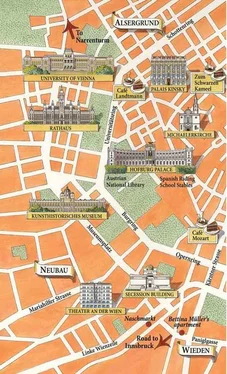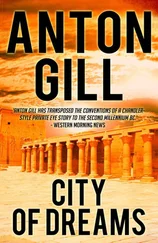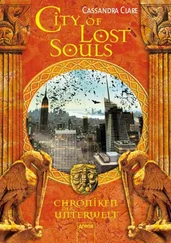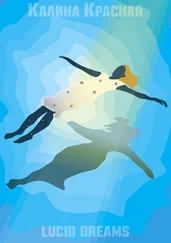“Yes,” she said, confused. Sarah fingered the key she wore on a chain around her neck. The little man had given her the key during the summer she worked in Prague. As far as she knew, it only opened one door, and that door was here, not in Vienna. “Why?”
“No reason. But watch your step. You must remain en garde , my dear.”
“Don’t worry,” Sarah promised. “What could possibly happen to me in Vienna?”
Sarah woke early the next morning, surprisingly none the worse for having hauled a fourteenth-century saint out of the Vltava the night before. Of course she didn’t really believe the man was actually John of Nepomuk, whose statue, with its crown of golden stars, she had passed many times on the Charles Bridge. She had also seen the saint’s tomb—a mind-boggling tribute to what the Baroque could do when it got its hands on a shitload of silver—in St. Vitus’s Cathedral. No, the most likely explanation was usually the correct one: the guy she had fished out of the river was a nut job in a costume. She was also not prepared to believe that the nut job was on some sort of rival crusade to find the Golden Fleece. Max imagined mythic quests around every corner. He was about a half step away from seeing Rudolf II on a piece of toast.
Max had been very generous, putting her up for the evening at the Four Seasons, where he said the manager was a friend. Sarah appreciated the high-thread-count sheets, but was horrified by the prices on the room service menu. No eggs should cost that much unless they came with the actual chickens and a handsome farmer who would rub your feet while you ate.
Sarah opened her computer and sent an e-mail to Alessandro, her former Boston roommate, advising him of her train times. It was Alessandro who had alerted her to the work of the nanobiologist Dr. Bettina Müller. He was teaching at the University of Vienna this year, and she would be staying with him.
The events of the previous evening almost seemed like a dream now. Nico. The restaurant. The dive into the river. The shots. Saint John’s pale blue eyes staring at her. Max’s hands. The feeling that she had made a mistake in letting him go. The desire to kiss him. Harriet.
Telling herself she was allowed to be curious, Sarah had done a little Internet search on Harriet Hunter before collapsing into bed the night before.
Max’s new girlfriend was pretty famous in Britain. Her academic credentials were impeccable—her PhD was from Oxford and she had published in her field. But she was best known as the host of a popular television show, Histories & Mysteries . Naturally, Sarah found some episodes of it on YouTube. Dr. Hunter practiced what was called archaeological history. In her programs she re-created the banquets of seventeenth-century kings, spent the night in freezing castles, slept on a straw-tick mattress, and used a chamber pot. She squeezed her petite but well-endowed frame into corsets, donned bonnets, attempted an exit from a tiny horse-drawn carriage while wearing an enormous crinoline. She took a bath in goats’ milk, plucked a goose, fought (unloaded) pistols at dawn. She punctuated her speech with Shakespearean exclamations: “Oh, pish!” “Heigh-ho, what have we here?” “What tilly-vally!” There was nothing she wouldn’t explore, investigate, or ingest.
“It’s 1598 and Oswald Croll is writing his Basilica chymica here in Prague,” ran one documentary clip. Dr. Harriet was dressed in a floor-length magus robe and stood before a table of glass beakers and pewter dishes. “We can—if we dare—follow his instructions for the making of a magical amulet: two ounces of dried toads ground to a fine powder, one complete menstruum of a virgin, one dram of unpierced pearls, one dram of coral, two scruples of Eastern saffron . . .” Apparently Dr. Harriet had not dared to try—or, more likely, was prevented from quaffing on-air—the collected monthly of some suitably innocent schoolgirl, but she promised her viewers that Croll believed his amulet was a surefire preventative from diseases both astral and venereal.
All of this had earned the historian a raft of snarky comments from her colleagues, who accused her of pandering, of trivializing history, of sensationalism, and of—horror of horrors—bad taste. The kind of things that generally got said of any academic who achieved a modicum of fame, published something more than five people wanted to read, or wore lipstick.
But really, the woman was impressive.
And, Sarah had to admit, a good choice for Max, who was also sort of an odd duck. Perhaps the sudden rush of feelings for Max was just the result of having a near-death experience, Sarah thought, as she set herself firmly toward Josefov, where Pollina’s parents kept an apartment for their daughter. Her brain had been flooded with chemicals and she hadn’t been thinking clearly. Anyway, she would be leaving for Vienna in the afternoon. Better for everyone.
* * *
“They tell us her immune system no good, and it worse if she has stress. So we try not to worry her. We act normal.”
Pollina’s caretaker, Jose Nieto, was waiting for Sarah on a street of glassware shops, holding the leash of Pollina’s elderly mastiff, Boris. Jose told her that the girl did not know how sick she was, and they needed to keep it that way.
“But she knows how she feels ,” Sarah argued. She was skeptical, anyway, about the ability of anyone to hide things from Pols. The girl’s blindness—and possibly her genius—had rendered her exceptionally observant. A bus pulled up and discharged a single-file line of young Chinese women in pink velour tracksuits. Prague was beginning to feel like a Hogarth painting entitled The Triumph of Capitalism .
“She say she feel fine, fine, fine. But when she think no one hear, she cough bad .” Jose had looked after Pollina since birth. Now he had dark circles under his eyes. “Her parents, they just leave,” he continued. “They go to Afghanistan for the archaeology. They nice people, but they don’t worry! Always I see rich people worry about stupid thing like if bread has gluten, but they just say, ‘Oh, darling, you must rest and not work so hard.’ They no understand her.”
The first-floor apartment was large and luxurious, though Sarah had to assume that while the art had been chosen by Pollina’s parents, the decorative touches had been added by Jose, who had a flair for whimsy. A row of Egyptian statues sported tiny bandanas. Sunglasses and a pipe had been unceremoniously added to an African ceremony mask. The crucifixes, however, had been left in their original state.
Pollina was seated at a grand piano. She was playing a little tune of just five notes over and over again, as if in a trance: E. B. C. A. G.
Sarah, whose mind automatically sought to classify these things, didn’t recognize the strangely compelling little passage, and wasn’t even sure which key the girl was playing in. Pollina stopped abruptly.
“Why did you break Max’s heart?” Pols demanded without preamble.
“I brought doughnuts from Boston.” Sarah placed the carton of requested Dunkin’ Donuts on the coffee table for the expats. Sarah was all too familiar with Pols’s blunt opinions. The last time they had spoken, the target had been her career. Was Sarah sure that teaching was really what she wanted to do with her understanding of music? Pols had an unerring nose for weak spots.
“I thought,” Pols continued now, coming forward and touching Sarah’s hand in greeting, “that people strove their whole lives to find love.”
Sarah sighed. Pollina was a genius, but she sometimes got very romantic notions into her head and she was only thirteen. How to explain that love and life didn’t always go easily together? It wouldn’t be obvious to Pollina why it was so important that Sarah make her own career and place in the world before she attached herself to someone else, that she and Max were leading very different lives.
Читать дальше












